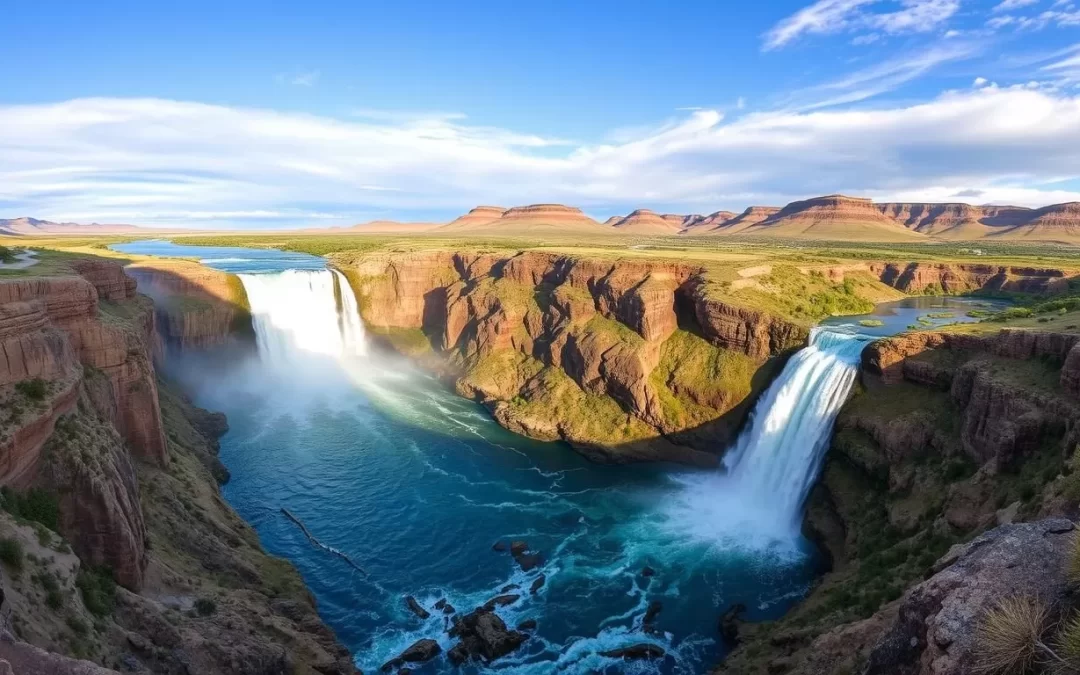Discover the breathtaking beauty of Shoshone Falls, a natural wonder that surpasses Niagara Falls in height. Located on the Snake River near Twin Falls, Idaho, Shoshone Falls is a must-see attraction that offers breathtaking views, recreational opportunities, and memorable experiences for visitors of all ages.
Experience the Majestic Shoshone Falls
At 212 feet tall and 900 feet wide, Shoshone Falls is one of the largest natural waterfalls in the United States, earning it the nickname “Niagara of the West.” This guide will walk you through everything you need to know about visiting Shoshone Falls, from the best viewing times to the top activities and nearby attractions.
Whether you’re planning a day trip or including Shoshone Falls in a longer Idaho adventure, this comprehensive guide will help you make the most of your visit to this magnificent natural landmark. Shoshone Falls promises an unforgettable experience with its stunning views and exciting recreational opportunities.
Welcome to your ultimate guide to Shoshone Falls, where you’ll discover why this natural wonder is a top destination in Southern Idaho.
Discovering the “Niagara of the West”
The majestic Shoshone Falls, often referred to as the ‘Niagara of the West,’ is a must-see destination. Located on the Snake River, it carves its way through a deep basalt canyon on its way to the Columbia River.
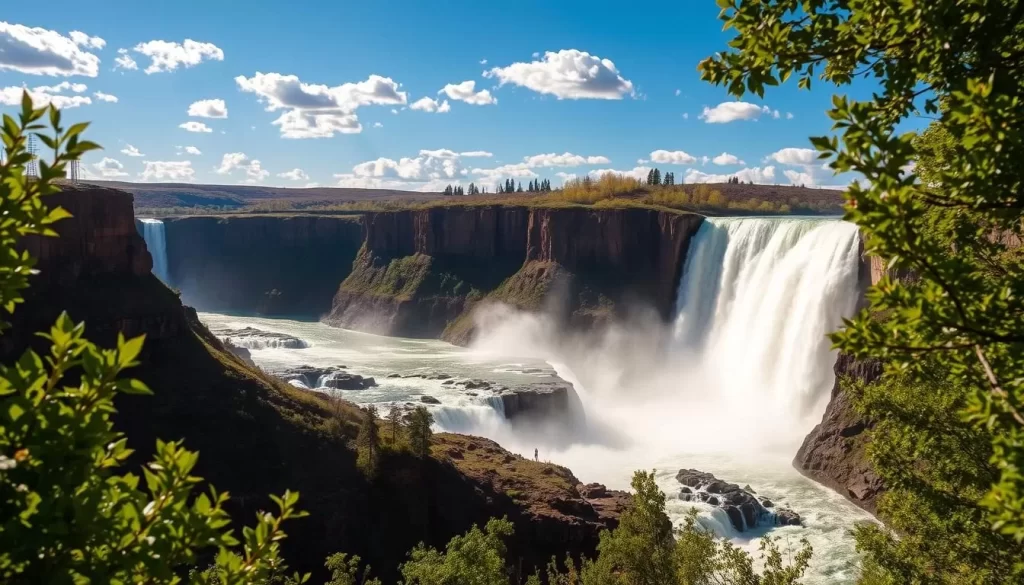
What Makes Shoshone Falls Special
Shoshone Falls stands as one of Southern Idaho’s most impressive natural wonders, where the Snake River dramatically plunges 212 feet. The surrounding canyon landscape showcases the geological history of the region, making it a unique attraction.
The History of Shoshone Falls
The historical significance of Shoshone Falls dates back to the mid-19th century when travelers along the Oregon Trail would detour to visit the Falls. In 1932, Federick and Martha Adams donated the land to the City of Twin Falls, stipulating it be maintained as a public park.
The water flow of Shoshone Falls varies dramatically throughout the years, with peak flow reaching 20,000 cubic feet per second during high snowmelt years. When you visit Shoshone Falls, you’ll witness a spectacle that rivals and exceeds Niagara Falls in height.
Planning Your Visit to Shoshone Falls
As you prepare to visit one of Idaho’s most breathtaking natural wonders, understanding the details of your trip can enhance your experience at Shoshone Falls. Whether you’re a nature enthusiast, a photographer, or just looking for a great day trip, planning your visit is key to enjoying all that Shoshone Falls has to offer.
Best Time to Visit
The best time to visit Shoshone Falls is in the spring, when the snowpack melts, creating a spectacular display of water flow. Summer visits are warmer but see reduced water flow due to irrigation. Winter offers a unique icy landscape but may come with road closures.
Admission Fees and Park Hours
The admission fee to Shoshone Falls Park is $5 per vehicle from March to September. Season passes are available for $25. The park is open from dawn to dusk year-round, except during poor road conditions.
How to Get There
Located at 4155 Shoshone Falls Grade Road in Twin Falls, Idaho, the park is accessible via a scenic canyon road. You can easily find your way using a map or GPS.
Parking and Facilities
Parking is convenient, with a large lot near the viewing area and handicap-accessible spaces. The park also offers clean restrooms, a concession stand, and picnic areas.
| Season | Water Flow | Activities |
|---|---|---|
| Spring | High | Viewing, Photography |
| Summer | Reduced | Warm weather activities |
| Winter | Variable | Ice formations, Winter landscapes |
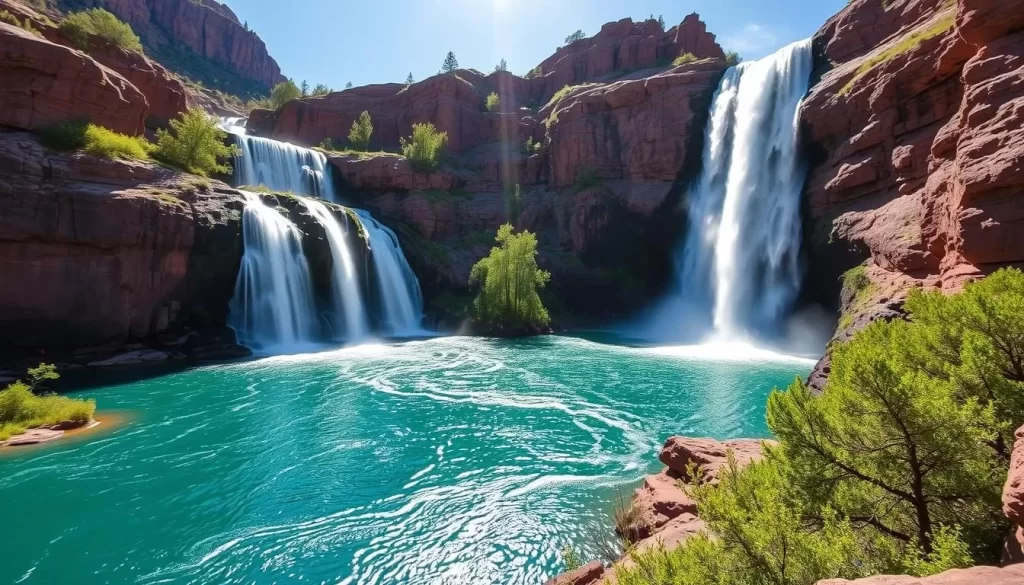
Top Things to Do at Shoshone Falls, Idaho
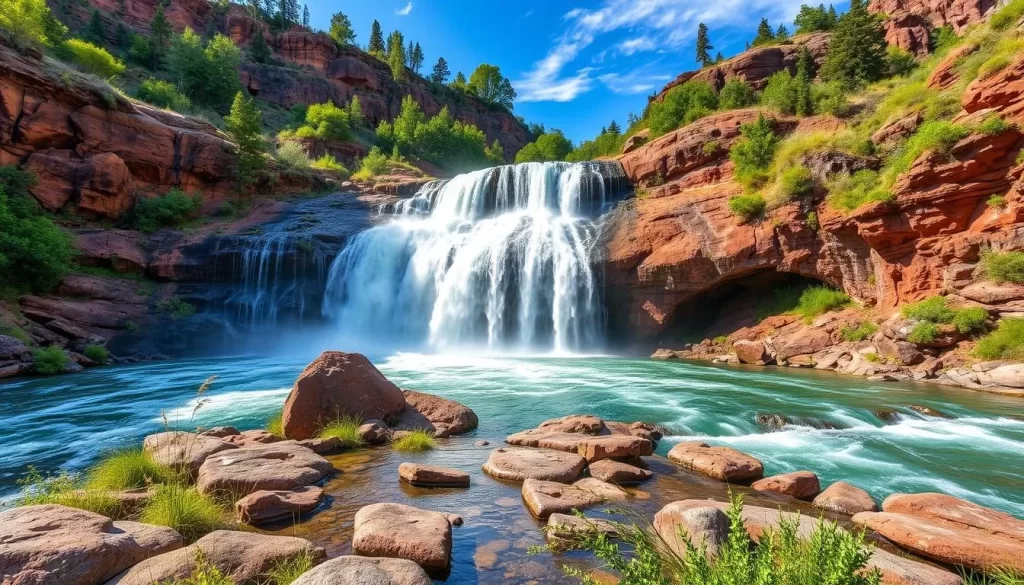
The Shoshone Falls area is a treasure trove of outdoor adventures and scenic views, waiting to be explored. As you visit Shoshone Falls, you’ll find a variety of activities to enjoy, from hiking and picnicking to photography and special events.
Viewing the Magnificent Falls
One of the primary attractions at Shoshone Falls is viewing the magnificent 212-foot waterfall from various observation platforms. You can feel the mist on your face and often spot rainbows forming in the spray during sunny days, making for an unforgettable experience.
Hiking the Canyon Rim Trail
Hiking the Canyon Rim Trail offers an excellent way to experience the area’s natural beauty. This paved trail extends more than 8 miles from Shoshone Falls westward along the Snake River Canyon, providing numerous vantage points and photo opportunities.
Picnicking with a View
Picnicking with a view is a popular activity at Shoshone Falls Park. Well-maintained grassy areas and picnic tables are positioned to take advantage of the spectacular canyon and waterfall scenery, making it perfect for a relaxing lunch break during your visit.
Photography Opportunities
Photography enthusiasts will find endless opportunities to capture Shoshone Falls in different lighting conditions. Morning offers the best chance for rainbow sightings, while golden hour provides dramatic lighting on the canyon walls, making for some incredible shots.
Shoshone Falls After Dark Event
Don’t miss the special Shoshone Falls After Dark event in spring, featuring a spectacular light show projected onto the falls and canyon walls, accompanied by music and food vendors for a truly magical evening experience.
With its diverse range of activities and stunning natural beauty, Shoshone Falls is a must-visit destination for outdoor enthusiasts. Whether you’re hiking, picnicking, or simply taking in the views, you’re sure to have an unforgettable experience at this Idaho gem.
Exploring Nearby Attractions
As you plan your visit to Shoshone Falls, consider exploring the nearby attractions that make the area a fantastic destination. The region around Twin Falls is rich in natural beauty and historical significance, offering something for everyone.
Dierkes Lake Park
Dierkes Lake Park is a must-visit attraction located conveniently on the way to Shoshone Falls. The park offers swimming areas, fishing spots, hiking trails, and picnic facilities, making it an ideal complement to your waterfall visit. You can easily spend a full day exploring both Dierkes Lake Park and Shoshone Falls.
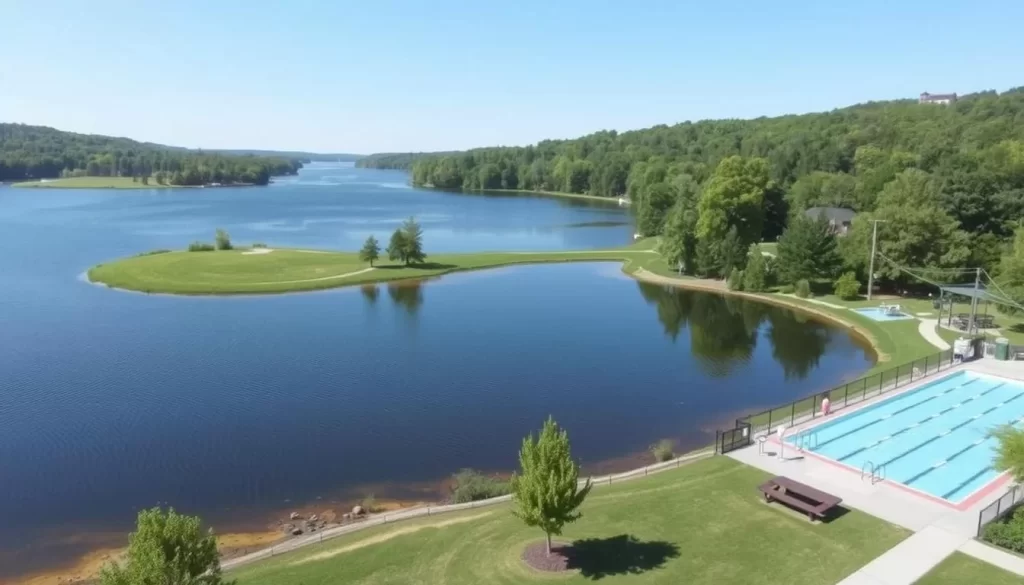
Perrine Bridge
The Perrine Bridge is an engineering marvel that spans the Snake River Canyon at a height of nearly 500 feet. It serves as the main northern entrance to Twin Falls and offers spectacular views of the canyon. Notably, it is the only bridge in the United States where BASE jumping is legally permitted year-round.
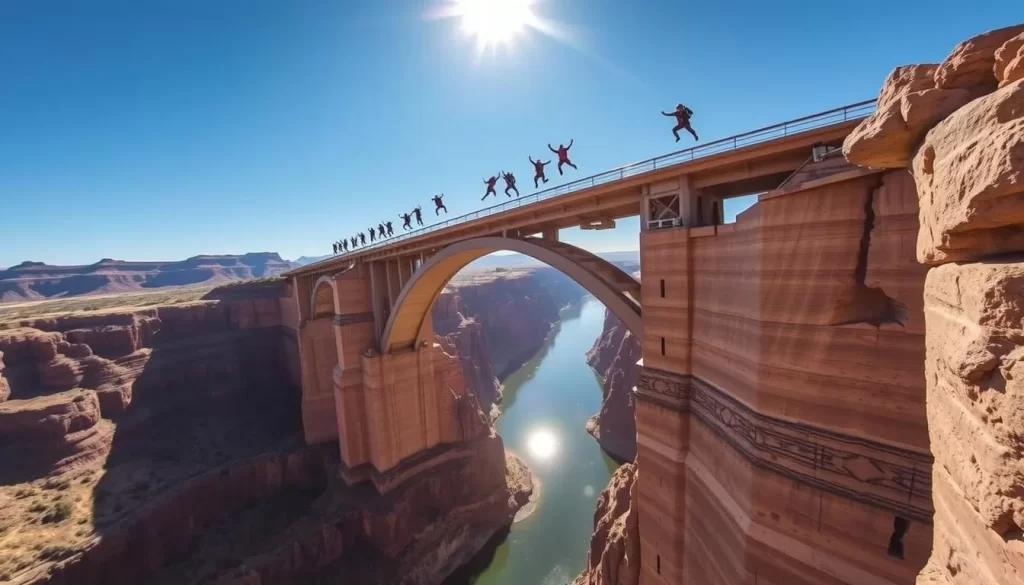
Evel Knievel Jump Site
For history enthusiasts, the Evel Knievel Jump Site is a fascinating attraction. Located just one mile up a hiking trail, it commemorates the famous daredevil’s 1974 attempt to jump the Snake River Canyon. This site is a must-visit for those interested in local history and daredevil stunts.
After exploring these attractions, you can enjoy local food specialties at one of the many restaurants in Twin Falls, some of which offer stunning views of the canyon. For those with more time, the region serves as a gateway to other Southern Idaho attractions, including Craters of the Moon National Monument.
Seasonal Experiences at Shoshone Falls
Shoshone Falls is a year-round destination that offers a unique experience with each changing season. Whether you’re interested in witnessing the peak water flow or enjoying recreational activities, there’s something for everyone at Shoshone Falls.
Spring: Peak Water Flow Season
Spring, particularly April, is the best time to see Shoshone Falls at its peak. The waterfall can rush up to 32,000 cubic feet per second, creating a thundering cascade that drenches visitors with mist and frequently produces stunning rainbows. The falls typically maintain flows around 12,000 cfs during spring months.
Summer: Recreation Activities
Summer brings warm temperatures, averaging around 80 degrees, and more moderate water flows. It’s an ideal time to combine your visit with recreational activities like swimming at nearby Dierkes Lake or hiking the canyon trails. Enjoy longer daylight hours and sunset views over the Snake River Canyon.
Fall and Winter at the Falls
In fall and winter, Shoshone Falls transforms into a serene landscape. Water levels often drop significantly, revealing more of the underlying rock formation. Winter visitors can enjoy unique photography opportunities with potential ice formations and waived admission fees. Check road conditions before traveling, as the access road may close during inclement weather.
- Experience the peak water flow in spring.
- Enjoy recreational activities in summer.
- Witness the serene landscape in fall and winter.
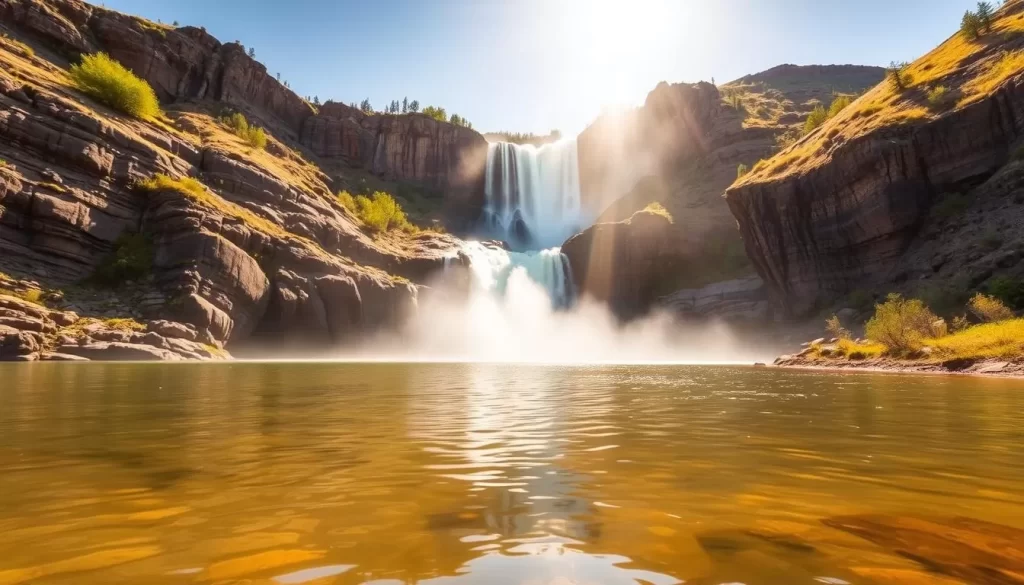
Conclusion: Making the Most of Your Shoshone Falls Visit
Shoshone Falls, known as the ‘Niagara of the West,’ promises an experience like no other, making it a highlight of any trip to Idaho. To make the most of your visit, plan ahead, considering the best times to visit and the activities you want to enjoy. Whether you’re drawn to the peak water flows of spring or the recreational opportunities of summer, Shoshone Falls has something for everyone. Don’t forget to check the Twin Falls parks website for updates on park hours and special events. With this guide, you’re ready for an unforgettable adventure at one of the United States’ most impressive natural wonders.
The above is subject to change.
Check back often to TRAVEL.COM for the latest travel tips and deals.
